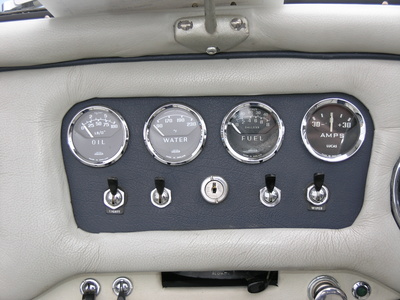Install an amp gauge in your car and you will instantly know the general condition of your vehicle's electrical system. Also known as an ammeter, this is one of the instruments that has largely been replaced with an idiot light. Without it, you will not know there is a problem until it is too late. The amp gauge tells you, at a glance, whether the system is charging and may allow you time to effect repairs before you get stuck in the middle of nowhere. Auto Meter is one of the more prominent manufacturers of after-market automotive gauges.

Use the wiring diagram and test light or multi-meter to locate the positive wire from the alternator to the fuse block. Then locate any wire that has power with the ignition off. Use the flashlight or drop light to see the wiring under the dash.

Put on your safety glasses. Disconnect the negative cable to the battery using one of your wrenches. This is a critical step that will help you avoid damaging your car's electrical system. Vehicles with a computer system or air bags can be seriously damaged if you ignore this step.

Install the gauge in the opening you have selected or the mounting bracket you purchased separately. Make sure all connections on the gauge are tight, including the factory connectors.

Using the wiring kit, attach the wires to the gauge and those previously identified as shown in the instruction sheet that came with your gauge. Be sure that all wire connections are tight and that no bare wires are exposed.

Re-connect the car battery and test the gauge as outlined in the instruction sheet. If the gauge does not read correctly, discharge state when the key is on without the engine, immediately disconnect the battery and follow the troubleshooting guidelines.
